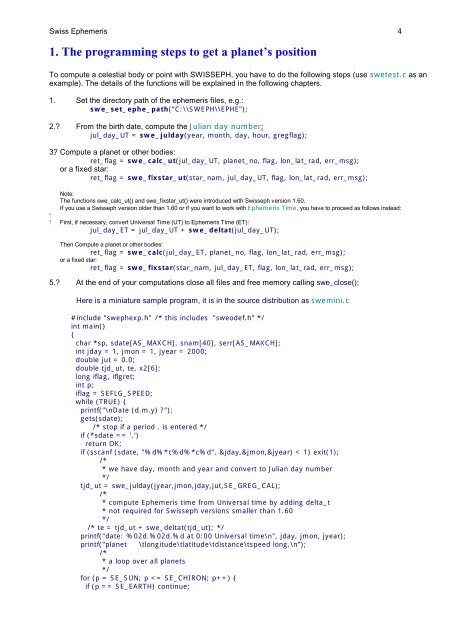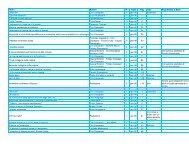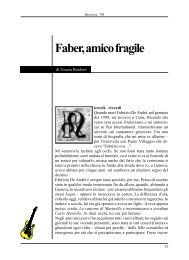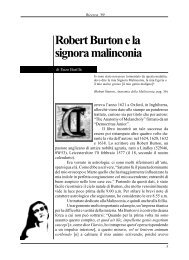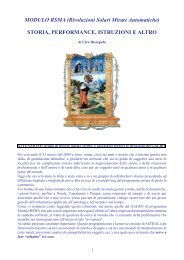Programming interface to the Swiss Ephemeris - programmiastral.com
Programming interface to the Swiss Ephemeris - programmiastral.com
Programming interface to the Swiss Ephemeris - programmiastral.com
Create successful ePaper yourself
Turn your PDF publications into a flip-book with our unique Google optimized e-Paper software.
<strong>Swiss</strong> <strong>Ephemeris</strong> 4<br />
1. The programming steps <strong>to</strong> get a planet’s position<br />
To <strong>com</strong>pute a celestial body or point with SWISSEPH, you have <strong>to</strong> do <strong>the</strong> following steps (use swetest.c as an<br />
example). The details of <strong>the</strong> functions will be explained in <strong>the</strong> following chapters.<br />
1. Set <strong>the</strong> direc<strong>to</strong>ry path of <strong>the</strong> ephemeris files, e.g.:<br />
swe_set_ephe_path(”C:\\SWEPH\\EPHE”);<br />
2. From <strong>the</strong> birth date, <strong>com</strong>pute <strong>the</strong> Julian day number:<br />
jul_day_UT = swe_julday(year, month, day, hour, gregflag);<br />
3. Compute a planet or o<strong>the</strong>r bodies:<br />
ret_flag = swe_calc_ut(jul_day_UT, planet_no, flag, lon_lat_rad, err_msg);<br />
or a fixed star:<br />
ret_flag = swe_fixstar_ut(star_nam, jul_day_UT, flag, lon_lat_rad, err_msg);<br />
Note:<br />
The functions swe_calc_ut() and swe_fixstar_ut() were introduced with <strong>Swiss</strong>eph version 1.60.<br />
If you use a <strong>Swiss</strong>eph version older than 1.60 or if you want <strong>to</strong> work with <strong>Ephemeris</strong> Time, you have <strong>to</strong> proceed as follows instead:<br />
<br />
First, if necessary, convert Universal Time (UT) <strong>to</strong> <strong>Ephemeris</strong> Time (ET):<br />
jul_day_ET = jul_day_UT + swe_deltat(jul_day_UT);<br />
Then Compute a planet or o<strong>the</strong>r bodies:<br />
ret_flag = swe_calc(jul_day_ET, planet_no, flag, lon_lat_rad, err_msg);<br />
or a fixed star:<br />
ret_flag = swe_fixstar(star_nam, jul_day_ET, flag, lon_lat_rad, err_msg);<br />
5. At <strong>the</strong> end of your <strong>com</strong>putations close all files and free memory calling swe_close();<br />
Here is a miniature sample program, it is in <strong>the</strong> source distribution as swemini.c<br />
#include "swephexp.h" /* this includes "sweodef.h" */<br />
int main()<br />
{<br />
char *sp, sdate[AS_MAXCH], snam[40], serr[AS_MAXCH];<br />
int jday = 1, jmon = 1, jyear = 2000;<br />
double jut = 0.0;<br />
double tjd_ut, te, x2[6];<br />
long iflag, iflgret;<br />
int p;<br />
iflag = SEFLG_SPEED;<br />
while (TRUE) {<br />
printf("\nDate (d.m.y) ");<br />
gets(sdate);<br />
/* s<strong>to</strong>p if a period . is entered */<br />
if (*sdate == '.')<br />
return OK;<br />
if (sscanf (sdate, "%d%*c%d%*c%d", &jday,&jmon,&jyear) < 1) exit(1);<br />
/*<br />
* we have day, month and year and convert <strong>to</strong> Julian day number<br />
*/<br />
tjd_ut = swe_julday(jyear,jmon,jday,jut,SE_GREG_CAL);<br />
/*<br />
* <strong>com</strong>pute <strong>Ephemeris</strong> time from Universal time by adding delta_t<br />
* not required for <strong>Swiss</strong>eph versions smaller than 1.60<br />
*/<br />
/* te = tjd_ut + swe_deltat(tjd_ut); */<br />
printf("date: %02d.%02d.%d at 0:00 Universal time\n", jday, jmon, jyear);<br />
printf("planet \tlongitude\tlatitude\tdistance\tspeed long.\n");<br />
/*<br />
* a loop over all planets<br />
*/<br />
for (p = SE_SUN; p


